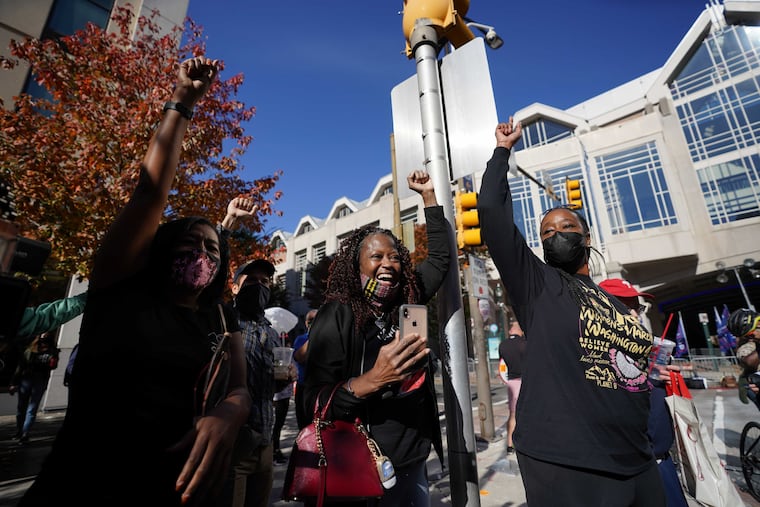Black women saved democracy yet again. Where’s our moment of gratitude? | Opinion
The Democratic Party simply cannot win many of the races on local, state, and federal levels without Black women consistently showing up.

Former Vice President Joseph R. Biden has been confirmed as the 46th president-elect of the United States after a dizzying presidential election cycle that had all of our heads spinning. After several years of xenophobic, racist, sexist, ableist rhetoric, harmful policies threatening to destroy American education, housing, and health care, plus incessant lying and nonsensical ramblings on social media, it was time for Donald Trump to vacate the White House. Amid a pandemic claiming millions of lives, including hundreds of thousands of Americans, Biden clinched the win and made history when his running mate, Sen. Kamala Harris, also became the first woman, first Black person, and first person of South Asian descent elected to be vice president.*
If it has not yet been made abundantly clear, the DNC has Black women voters and community organizers to thank for this victory.
Black women in Philadelphia came through for the party in arguably the biggest presidential election of our lifetimes. While Biden didn’t get Obama-level turnout, Philly saw a slight voting uptick this election compared with 2016, and Biden carried solid support among Black Americans in swing states like South Carolina, Georgia, and Pennsylvania. The support may stem from a lingering affinity for former President Barack Obama and nostalgia for better times, as well as the promise of a Black woman making history by being elected into the second-highest office in the country. When the race was finally called, and Pennsylvania’s 20 electoral votes came in for Biden, it was clear that Philadelphia voters were critical to the Scranton hometown hero’s win.
On Nov. 4, I tweeted that if the race came down to Pennsylvania, we would have Black women in Philly to thank. All eyes were on our city as the Democratic-leaning mail-in ballots poured in, and sure enough, the final margin proved that Philadelphia was clutch. What I knew before the results is that across racial and class divisions, women vote more than men.
More than that, Black American women have been one of the most consistent, reliable, and powerful voting blocs for several decades. According to Pew Research Center, the number of eligible Black voters was a record 30 million for this presidential election, and about one-third of them live in battleground states like Pennsylvania and Georgia. Since 1980, Black women have turned out in higher numbers than Black men by as many as 10 percentage points (64% of eligible women compared with 54% of eligible men in 2016). The Democratic Party simply cannot win many of the races on local, state, and federal levels without Black women consistently showing up and casting their votes in support of party candidates.
Before the results poured in, I also understood that a city with a 26% poverty rate, the highest incarceration rate for any large jurisdiction in the country, and one of the highest murder rates of large cities in the nation would see struggle when it came to votes from its Black male population — too many have been disenfranchised from voting by systemic obstacles. Additionally, a recent poll conducted by local faith-based social justice organization POWER found that 11% of eligible Black male voters in Philadelphia under age 50 were undecided or had no intention of voting. Among those who were planning to vote, 14% said they were voting for Trump vs. 3% of eligible Black women voters.
» READ MORE: How Joe Biden won Pennsylvania
If Biden was going to win, he would have to rely primarily on the Black mothers and church mothers, Black women heads of households, the Black women students and sororities, and the Black women leading community organizing efforts to get out the vote.
In Philadelphia, Vote That Jawn, Black Lives Matter at School, and Philly Youth VOTE! are among local organizing efforts led primarily by Black girls and women that took to social media and the streets to get people registered and voting. We know that when Black women vote, we bring our families and neighbors with us to the polls. This year, Black women not only motivated our communities to participate — we also took to social media to make sure that issues that mattered to us were part of larger conversations about the candidates and elections.
» READ MORE: Black women are founders of American democracy. How will we live up to their ideals? | Opinion
Admittedly, I had reservations about this election and whether or not kids locked in cages, white supremacists being called “fine people,” or numerous accusations of sexual assault would be enough to oust Trump from office. I was right to be concerned because more people turned out to vote for the president this year than when he first ran for office: a disheartening 70 million-plus voters decided he was the right person to continue leading our nation, a reality we’ll be reckoning with for years.
Thankfully, Black women did what we always do even with little to no respect, regard, or gratitude: We showed up, took the reigns, and saved democracy once again. One time for the Philly jawns.
Feminista Jones is an author, activist, and doctoral student at Temple University and was named one of Philadelphia’s 76 most influential people in 2020 by Philadelphia Magazine.
*Editor’s note: This post has been updated to reflect that Charles Curtis, not Kamala Harris, was the first person of color elected to be vice president.